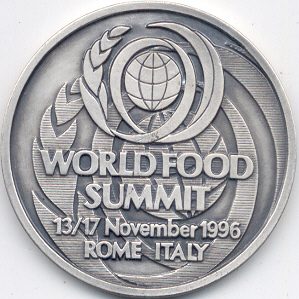World Food Summit
World Food Summit
The World Food Summit is a significant international conference aimed at addressing global food security, nutrition, and sustainable agriculture practices. Initiated by the Food and Agriculture Organization (FAO) of the United Nations, the summit brings together heads of state, government officials, non-governmental organizations (NGOs), and other stakeholders to discuss and develop strategies to combat hunger and promote food security worldwide.
Background[edit | edit source]
The first World Food Summit was held in Rome, Italy, in 1996, with the primary goal of renewing a global commitment to the fight against hunger. The summit was convened in response to ongoing food security challenges and aimed to ensure that everyone has regular access to enough high-quality food to lead active, healthy lives. The 1996 summit concluded with the adoption of the Rome Declaration on World Food Security and the World Food Summit Plan of Action, setting the ambitious target of halving the number of undernourished people by 2015.
Objectives[edit | edit source]
The main objectives of the World Food Summit include:
- Eradicating hunger and ensuring food security for all people.
- Promoting sustainable agricultural practices and rural development to support food production.
- Enhancing international cooperation and partnership in the fight against hunger.
- Addressing the root causes of hunger and poverty by integrating food security and poverty reduction strategies.
Key Summits[edit | edit source]
Following the initial summit in 1996, subsequent meetings have been held to assess progress, update strategies, and reaffirm global commitments to ending hunger. Notable summits include:
- World Food Summit: five years later (2002) - This meeting focused on reviewing the progress made since the original summit and reinvigorating efforts towards meeting its goals.
- The High-Level Conference on World Food Security (2008) - This conference addressed new challenges to food security, particularly in the context of climate change and bioenergy.
Challenges and Criticisms[edit | edit source]
Despite the efforts and initiatives launched following the World Food Summits, significant challenges remain in the fight against hunger and malnutrition. Critics argue that progress has been uneven and that more effective action is needed to address the root causes of food insecurity, such as poverty, conflict, and climate change. There is also a call for greater emphasis on sustainable agricultural practices and for ensuring that smallholder farmers, particularly in developing countries, have access to resources and markets.
Future Directions[edit | edit source]
The future of the World Food Summit lies in its ability to adapt to the changing global landscape of food security and nutrition. This includes integrating new technologies, enhancing international cooperation, and ensuring that policies are inclusive and support the most vulnerable populations. The Sustainable Development Goals (SDGs), particularly Goal 2, which aims to end hunger, achieve food security and improved nutrition, and promote sustainable agriculture, are now a key framework guiding the efforts of the World Food Summit and its stakeholders.
Search WikiMD
Ad.Tired of being Overweight? Try W8MD's NYC physician weight loss.
Semaglutide (Ozempic / Wegovy and Tirzepatide (Mounjaro / Zepbound) available. Call 718 946 5500.
Advertise on WikiMD
|
WikiMD's Wellness Encyclopedia |
| Let Food Be Thy Medicine Medicine Thy Food - Hippocrates |
Translate this page: - East Asian
中文,
日本,
한국어,
South Asian
हिन्दी,
தமிழ்,
తెలుగు,
Urdu,
ಕನ್ನಡ,
Southeast Asian
Indonesian,
Vietnamese,
Thai,
မြန်မာဘာသာ,
বাংলা
European
español,
Deutsch,
français,
Greek,
português do Brasil,
polski,
română,
русский,
Nederlands,
norsk,
svenska,
suomi,
Italian
Middle Eastern & African
عربى,
Turkish,
Persian,
Hebrew,
Afrikaans,
isiZulu,
Kiswahili,
Other
Bulgarian,
Hungarian,
Czech,
Swedish,
മലയാളം,
मराठी,
ਪੰਜਾਬੀ,
ગુજરાતી,
Portuguese,
Ukrainian
Medical Disclaimer: WikiMD is not a substitute for professional medical advice. The information on WikiMD is provided as an information resource only, may be incorrect, outdated or misleading, and is not to be used or relied on for any diagnostic or treatment purposes. Please consult your health care provider before making any healthcare decisions or for guidance about a specific medical condition. WikiMD expressly disclaims responsibility, and shall have no liability, for any damages, loss, injury, or liability whatsoever suffered as a result of your reliance on the information contained in this site. By visiting this site you agree to the foregoing terms and conditions, which may from time to time be changed or supplemented by WikiMD. If you do not agree to the foregoing terms and conditions, you should not enter or use this site. See full disclaimer.
Credits:Most images are courtesy of Wikimedia commons, and templates, categories Wikipedia, licensed under CC BY SA or similar.
Contributors: Prab R. Tumpati, MD

